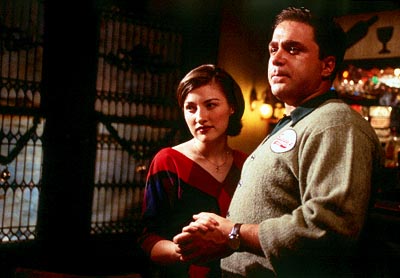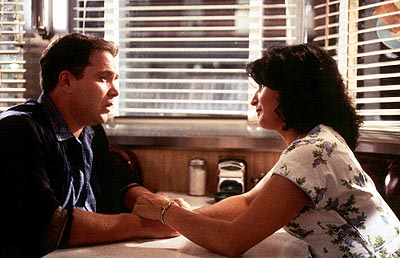

It is easy to see why Two Family House won the Audience Award at this year's Sundance Film Festival. It is a sweet look back at a dreamer living in a time when things seemed simpler. It doesn't ask for much from the viewer and delivers a sweet, affecting story. The dreamer in question is Buddy Visalo (Michael Rispoli, Summer of Sam, The Third Miracle), a simple factory worker who lives in New York. His family and friends are content with their lives, but Buddy wants something more. He thinks up ways to hit it big, and each time he fails. His pizza delivery service, his limo service, and his house painting service all failed. His latest dream is to buy a house in convert the bottom floor into a bar where he can sing.
His wife Estelle (Katherine Narducci, A Bronx Tale, Copland) objects, mainly because she believes this scheme will also fail. The house is also in a predominantly Irish neighborhood. Buddy buys the house anyway, and discovers that there are a family of poor Irish immigrants upstairs, Jim O'Neary (Kevin Conway, Looking for Richard, The Quick and the Dead) and his much younger pregnant wife Mary (Kelly Macdonald, The Loss of Sexual Innocence, Elizabeth). When Mary gives birth, it is obvious that the baby is not Jim's. Buddy finally manages to kick them out, but feels guilty. He ends up renting an apartment for Mary and her son without the knowledge of Estelle. Construction on the bar continues, as do Estelle's objections.
Buddy's near infinite optimism is what separates Two Family House from other similar movies. Writer/director Raymond De Felitta, Bronx Cheers, Cafe Society) is rife with racism against the Irish, Italians, and African-Americans (he partially based the story on his own uncle). Estelle embodies most of this. She is unwilling to look at matters in a fresh light. She grew up in an Italian neighborhood, and that is all she knows. She is a good person, just extremely ignorant. Buddy is different. He is looking beyond what people tell him, especially in terms of Mary. Unlike Estelle, she listens to Buddy's dreams and hopes. The language and some of the stereotypes are harsh, but De Felitta uses them to show how different Buddy is. In the beginning, he was using some of the stereotypes, but he slowly changes his ways as he begins to realize things about his life. The racism serves as a sort of reminder that not everything can be perfect in Buddy's world.
Rispoli is fantastic as Buddy. Buddy has a genuine love for his wife, even with all her complaining. He wants to succeed so he can provide for Estelle. When he begins feeling affection towards Mary, he feels extreme guilt because of the love for his wife. Narducci and Macdonald are also great as Estelle and Mary. Estelle does not understand her husband, but goes along with him because she loves him. She is willing to overlook many of his past failures, but only to a certain point. Mary is very guarded about her emotions. It takes a long time for her to open up to Buddy; she does not usually get any sort of respect from men. These are very real people. The music of the John Pizzarelli Trio also helps De Felitta to bring his vision of New York in the late 50s to life. All of this makes Two Story House a thoroughly charming experience.